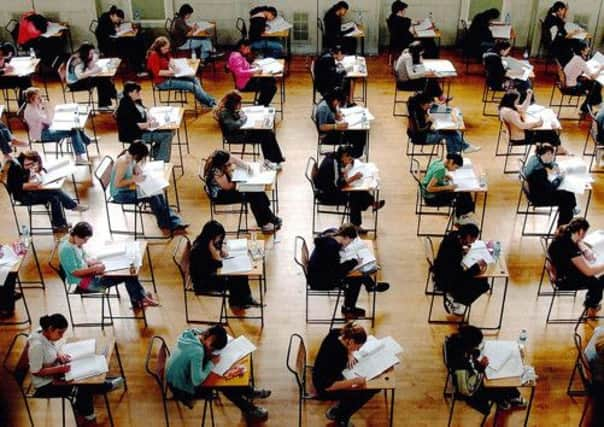New National exams to test students in modern skills


FOR young people, qualifications are increasingly important. In today’s tough economic climate, there is competition everywhere – for jobs, training programmes, apprenticeships and college or university places – and it is qualifications which help young people take the next step in their lives.
Not everyone leaves school with a clutch of As at Higher; some do just that, but many others achieve different qualifications which set them on their own successful path. It is the job of the SQA (Scottish Qualifications Authority) to provide pathways and qualifications to recognise the achievements of all our young people and deliver the skills needed for Scotland’s economy – today and tomorrow.
Advertisement
Hide AdAdvertisement
Hide AdThis year, there is a change to what’s on offer, with the introduction of the new National qualifications for school pupils who have just entered S4. A simpler, more streamlined system will see National 1-National 5 replace a range of qualifications, including Standard Grades, which served Scotland well for more than 25 years.
The Nationals build on the success of Standard Grades. They reward a wide range of achievement and reflect work completed throughout the school year, not just in final exams. They were developed to support Scotland’s Curriculum for Excellence, which aims to help all young people in Scotland fulfil their potential and take their place in a modern society and economy. Nationals are more relevant and better-suited to testing the skills required to succeed in the 21st century.
The new National Qualifications place greater emphasis on “deeper learning”; in other words, helping young people to think for themselves. They will still need to recall facts and figures, and grasp key concepts – knowledge and understanding is central to the new qualifications. However, young people will increasingly need to show they can apply and interpret that knowledge and understanding and display a wider range of skills more relevant to modern society and make connections across their learning, just as we all do in our working lives.
Let’s illustrate that with an example; the introduction of renewable energy sources. Pupils studying this topic as part of our new National 5 environmental science course could be expected to investigate their own or their school’s energy use or research the impact of renewable and non-renewable energy sources on the environment. Studying these topics will require pupils to use a range of skills across different subjects – including scientific knowledge, data collection, presentation skills, numeracy and team-working.
The example shows how numeracy skills can be applied across different curriculum areas. Responsibility for learning in literacy and numeracy lies with all teachers and is no longer solely the preserve of maths and English specialists. We need to help young people make connections across their learning. Another instance of young people developing numeracy skills could be through fundraising events, where pupils take responsibility for managing money and presenting a set of accounts.
The first three years at secondary are now described as a broad general education, with young people studying across all curriculum areas up to the end of S3. By the time they start their Nationals, they should be at a more advanced point than a student who would have previously started their Standard Grades in S3. At National 5 – equivalent to a Credit pass at Standard Grade – final exams remain an important part of the system, but in the majority of subjects, there is coursework and ongoing assessment throughout the year.
Those studying National 1-National 4 (National 4 is equivalent to a Standard Grade General pass) will not have formal exams next spring but will be assessed on an ongoing basis by their teachers.
SQA takes its responsibility to uphold the high standards of Scottish qualifications very seriously and has put quality assurance systems in place to ensure the assessment of the new qualifications is rigorous and meets national standards.
Advertisement
Hide AdAdvertisement
Hide AdI believe we are moving in the right direction – and that over time, employers will see a positive difference in young people moving into the world of work. In all these changes, employers, teachers, lecturers and representatives from universities have been involved in the development of the new qualifications to ensure we are meeting future needs.
The wider range of skills developed and assessed under the new Nationals is supported by SQA awards – in areas like leadership, employability, and personal finance – which reward what young people are doing outside school and reflect their personal strengths.
In a year’s time, this year’s S4s will be the new S5s, taking new Highers – and the year after, the new Advanced Highers. This sensible, stepped change into new Nationals ensures stability, with the strength of the current qualifications retained.
Our qualifications must evolve and develop with one target in mind – to deliver the very best for our young people, employers, the economy and Scotland as a whole.
• Dr Gill Stewart is director of qualifications development, SQA [Scottish Qualifications Authority]